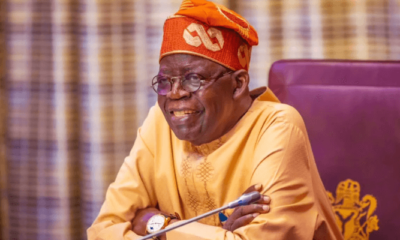Global Issues
Asake, Fatherhood, And The Cycle Of Neglect: A Wake-Up Call For Nigerian Men And Their Children -By Isaac Asabor
A society thrives when families function effectively. The neglect and abandonment of children must stop, and at the same time, children who achieve success despite hardships must not fall into the same trap of neglecting their parents. By addressing these issues holistically, Nigeria can begin to mend the broken bridges of family and instill values that promote responsibility and care. The time to act is now.

Fatherhood is not just a biological event; it is a lifelong responsibility that extends beyond conception. Unfortunately, in Nigeria, the trend of men denying responsibility for pregnancies is worrisome. The recent scandal involving Nigerian music sensation Asake and his father has once again brought this issue to the fore, sparking conversations about the responsibilities of men toward their offsprings and the moral obligations of children to their parents.
In many cases, men walk away from their responsibilities, leaving women to bear the burden of raising children alone. These children, often brought up in hardship, grow to become successful individuals. Yet, the cycle of neglect continues as some of these children, in turn, neglect their absentee fathers. This vicious cycle is one that demands urgent attention because it speaks to the breakdown of family values and moral responsibility in our society.
Without a doubt, the controversy surrounding Asake’s father is not an isolated incident. The story has been met with mixed reactions, with many Nigerians expressing disappointment in the singer’s apparent estrangement from his father. However, upon deeper reflection, it raises fundamental questions: Should a child care for a father who abandoned him at birth? Should a father expect love and support from a child he once denied?
Asake’s case mirrors countless similar stories in Nigeria, where men irresponsibly deny paternity, leaving women to shoulder the responsibility of parenthood alone. The consequences of such actions are dire, affecting the emotional and psychological well-being of the child. Many children grow up feeling unwanted and rejected, leading to resentment toward their fathers. Consequently, when they achieve success, they see no reason to acknowledge or support the very men who once discarded them.
In fact, the denial of paternity is not a new phenomenon in Nigeria. Countless women have shared heartbreaking stories of being abandoned during pregnancy, left to raise children on their own. Some men deny responsibility outright, while others, under the influence of family pressure or societal stigma, shy away from acknowledging their children.
This issue is exacerbated by the lack of legal frameworks that hold men accountable for their responsibilities. Unlike in some Western countries where child support laws ensure that fathers contribute financially to the upbringing of their children, Nigeria lacks strict enforcement mechanisms to curb this menace. This legal loophole emboldens irresponsible men to continue this reckless behavior without facing consequences.
Children who grow up without the presence of their fathers often face emotional and psychological struggles. The absence of a father figure can lead to low self-esteem, difficulty in forming relationships, and even behavioral problems. Many of these children grow up harboring deep-seated resentment against their absentee fathers.
Beyond personal grievances, the societal impact of this trend is equally alarming. A society where fathers abandon their responsibilities fosters a culture of irresponsibility and broken homes. This ultimately affects the moral fabric of the nation, leading to an increase in crime, social vices, and a general sense of neglect among the younger generation.
While it is easy to place sole blame on irresponsible fathers, mothers and society at large also have a role to play. Some women knowingly get involved with men who have a track record of abandoning their children. Others fail to take legal steps to demand accountability from these men.
Society, on its part, must stop enabling men who engage in paternity denial. Rather than shielding such men or making excuses for them, communities should begin to hold them accountable. Churches, traditional institutions, and even employers can play a role in ensuring that men who father children take responsibility for them.
While the anger of children abandoned by their fathers is understandable, it is also important to stress that children must not completely eschew their moral responsibility toward their parents. No matter the circumstances of birth, there is an African cultural expectation that children take care of their parents in old age. Forgiveness should be encouraged, as resentment only breeds bitterness and continues the cycle of emotional suffering.
Successful children should be cautious not to adopt the very neglect they suffered. The ability to rise above personal grievances and extend care to an estranged parent, even if minimal, is a sign of strength and growth. This does not mean blindly accepting toxic relationships, but rather, ensuring that bitterness does not cloud the opportunity to set a better example for future generations.
It is time for Nigerian men to take fatherhood seriously. Bringing a child into the world is not just about biology; it is about emotional, financial, and psychological commitment. Men must understand that denying a child today might lead to severe consequences in the future, not just for the child but for themselves as well.
Legal reforms are necessary to ensure that men who abandon their children are held accountable. Nigeria must implement and enforce child support laws that compel men to contribute to the upbringing of their children. DNA testing should also be made more accessible and affordable to address paternity disputes fairly.
At the family level, parents must begin to instill in their sons the values of responsibility and accountability. Fatherhood is a privilege, not just a duty, and men must be made to understand that their actions have lasting consequences.
On the part of children, those who have suffered abandonment should seek healing and closure. Therapy, counseling, and support groups can help individuals navigate the trauma of absentee fathers. Forgiveness, though difficult, can be a powerful tool in breaking the chain of generational pain.
The Asake scandal is just one of many stories that highlight the growing trend of men abandoning their paternal duties and the resultant estrangement between fathers and their children. It is a wake-up call for Nigerian men to take responsibility and for successful children to embrace the path of forgiveness.
A society thrives when families function effectively. The neglect and abandonment of children must stop, and at the same time, children who achieve success despite hardships must not fall into the same trap of neglecting their parents. By addressing these issues holistically, Nigeria can begin to mend the broken bridges of family and instill values that promote responsibility and care. The time to act is now.









